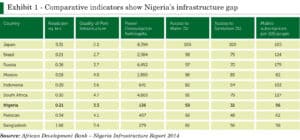Bridging Nigeria’s $2.9 trillion Infrastructure Gap
– A review of viable investment and financing options
Recent estimates by the National Planning Commission (NPC) reveal that Nigeria requires an investment of $2.9 trillion within the next 30 years to build up its infrastructure to globally competitivelevels. As the Nigerian governmentfaces critical budget constraints, so also is the private sectorlimited in its funding capacity. Furthermore, private investors are increasingly losing their appetite for infrastructure projects, due torisk concerns. Nevertheless, to bridge the infrastructure gap, the private and public sector need to explore funding options that wouldenable both sides achieve their social and economic objectives.
With a fast-growing population, increasing urbanisation and changing consumer lifestyles, the demand for quality public infrastructure in Nigeria has never been so high. Across key sectors of the economy – Power; Transport and Aviation; Housing and Health;infrastructure deficiencies have remained a real challenge. From truncated pipe-borne water networks andinadequate electricity supply,to sub-standard airport facilities andbadroads causing time consumingtraffic jams, Nigeria’s infrastructure situationhas limited its social and economic development.

Indeed, infrastructure plays a pivotal role in the achievement of economic transformation and inclusive growth. The World Bank estimates that increasing the stock of economic and social infrastructure investment in core sectors by 10% can increase Nigeria’s GDP by up to one percentage point.
Governments are typically responsible for developing infrastructure, with a primary focus on the development of the economy and the delivery of required social amenities to its citizens. Using taxes and commodity revenues, the government, at all levels, prioritises, budgets and funds infrastructure development projects.